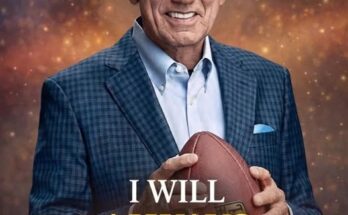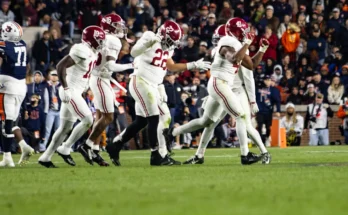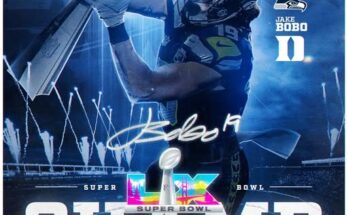Tyreek Hill causes controversy as he brings up Adidas in a conversation between Darius Slayton and Micah Parsons.
In the modern NFL, where personalities and brand allegiances often overlap with athletic prowess, few players wear their opinions as boldly as Miami Dolphins wide receiver Tyreek Hill. Known for his unmatched speed and brash confidence, Hill has become one of the league’s most dynamic figures both on and off the field. But this week, Hill sparked an unexpected wave of controversy—not for a touchdown celebration or a social media jab, but for injecting a corporate allegiance into what began as a light-hearted conversation between two fellow NFL players: New York Giants wide receiver Darius Slayton and Dallas Cowboys linebacker Micah Parsons.
What was initially a casual, humorous exchange about performance and off-season training quickly took a sharp turn when Hill, unprompted, inserted Adidas into the dialogue—seemingly as a veiled (or perhaps very direct) endorsement and critique of rival brands. The result? A viral moment that has athletes, fans, and analysts across the sports world buzzing about branding, loyalty, and whether there are still lines that shouldn’t be crossed in the ever-blending world of sports and commerce.
The Conversation That Sparked It All
The incident began during a joint appearance on a football podcast hosted by Micah Parsons, which featured Darius Slayton as a guest. The two were discussing off-season routines, the best cleats for cutting on turf, and sharing jokes about training camp grind. Everything remained relaxed—until Tyreek Hill, who was tuning into the podcast via livestream and chiming in through social media, dropped a comment that flipped the tone.
“Y’all still running around in Nike? That’s wild,” Hill wrote. “Come talk to Adidas when you’re ready for real speed.”
Micah Parsons laughed it off at first, responding on the podcast, “Here go Tyreek again tryna sell us some three-stripe dreams.” Darius Slayton, however, was less amused.
Slayton’s response was measured but pointed: “I mean, we all got our preferences. I didn’t know this was a marketing seminar.”
And just like that, what started as friendly banter turned into a microcosm of the larger branding wars within professional sports.
The Business of Branding in the NFL
Unlike the NBA, where shoe deals are often front and center, the NFL has typically maintained a more team-centric image. However, with stars like Hill using their platform to promote specific brands—especially ones they’re sponsored by—the league is slowly shifting toward a model where individual endorsement deals increasingly shape public perception.
Tyreek Hill is one of Adidas’s most high-profile NFL athletes. Since signing with the brand in 2019, he’s been the face of their football cleat line, often credited with influencing younger players to consider switching from the traditionally dominant Nike.
But critics argue that inserting brand talk into public discourse between players crosses an invisible line. “There’s a time and place for everything,” one former NFL executive told The Athletic. “When a conversation between players becomes a promotional platform, you risk undermining genuine interaction.”
Darius Slayton Pushes Back
Following the podcast, Slayton addressed the situation via X (formerly Twitter), writing: “I respect Tyreek as a player, but we were talking football—not sponsorships. I wear what I feel best in, and I’m not here to push product unless it helps me play better.”
The tweet gained traction quickly, with hundreds of current and former players chiming in. Giants fans applauded Slayton for standing firm, while some Dolphins and Adidas loyalists defended Hill’s right to promote what he believes in.
Slayton later clarified that his frustration wasn’t about Adidas specifically but about the larger trend of “corporate commentary seeping into player-to-player dialogue.”
Micah Parsons Tries to Play Mediator
Caught in the middle, Parsons used his next podcast episode to offer context and a calming tone.
“Tyreek is my guy—he’s just passionate. He didn’t mean any harm,” Parsons said. “But I also get where Darius is coming from. Sometimes you just want to talk the game without feeling like a walking billboard.”
Parsons’s comments were praised for their maturity and ability to de-escalate a growing debate. Yet, the damage—or perhaps the attention—was already done.
The Ripple Effect: Players React
Within 48 hours, the conversation had spread across NFL locker rooms. Several players, including Kansas City’s Marquez Valdes-Scantling and Washington’s Terry McLaurin, took to social media to share their takes.
McLaurin posted a photo of his cleats with the caption: “Whatever fits best—team over brand.”
Meanwhile, Hill remained unapologetic. “Y’all can keep that weak gear,” he posted to Instagram Stories with a laughing emoji and a photo of his customized Adidas cleats. “I’ll keep racing past you in stripes.”
The post racked up hundreds of thousands of views and was reshared by Adidas’s official football account, subtly endorsing Hill’s comments.
Where Does the NFL Stand?
The league itself has remained mostly silent, but behind the scenes, there’s growing concern that these brand battles could escalate. While the NFL allows individual sponsorships, overtly promoting brands in team-related spaces or during league-affiliated interviews is generally discouraged.
“This could be the beginning of a much larger issue,” said a marketing director for a major sports agency. “Tyreek’s comments, while relatively benign on the surface, may encourage other athletes to use public platforms to promote partners—potentially clashing with team sponsors or even the NFL’s official deals.”
Fans React: Divided Loyalties and Memes Galore
As always, fans added their flavor to the controversy. Memes flooded Reddit and X, with users joking about “Adidas Hill vs. Nike Slayton in a 40-yard dash cage match.” One fan wrote, “Tyreek out here trying to start a brand war like it’s Call of Duty factions.”
Others pointed out the irony of brand loyalty in a league where performance often outweighs apparel. “At the end of the day, if you ball, nobody cares what shoes you’re wearing,” one fan posted.
Yet, some younger athletes and high school players commented that Hill’s endorsement actually made them reconsider their cleat choices—proving that even an offhand comment can influence perception.
Hill’s Larger Influence on Culture
This isn’t the first time Tyreek Hill has blurred the lines between athlete and brand ambassador. His “Cheetah” persona has become a staple of NFL pop culture, and he’s been one of the most outspoken players about athlete empowerment in the marketing space.
In an interview last season, Hill said, “Why wouldn’t I promote something that I believe helps me perform better? That’s not selling out—that’s smart business.”
To his credit, Hill has consistently walked the talk—literally—wearing Adidas cleats in every game, customizing them to reflect his personality, stats, and off-field interests. He’s turned his footwear into a visual signature, much like Odell Beckham Jr. did with Nike in his prime.
A New Era of Athlete Branding?
The Hill-Slayton-Parsons moment might be seen years from now as a small but pivotal turning point. The question it raises is not just about Adidas or Nike—it’s about what kind of conversations NFL players are allowed to have without the looming influence of business interests.
In an age where players are brands unto themselves, the boundaries between locker room talk, podcast banter, and brand strategy are growing increasingly thin.
“This isn’t going away,” said an anonymous NFL marketing consultant. “As long as brands are tied to athlete performance—and athletes are more visible than ever—it’s only going to get more complicated.”
The Real Winners and Losers
Did Tyreek Hill overstep? That depends on your perspective. From a marketing lens, he pulled off a masterstroke—injecting Adidas into a viral moment without spending a dime. From a player respect angle, some feel he veered too far into business during what should’ve been an organic, football-first conversation.
For now, Hill is undeterred. “I say what I say,” he posted. “If you fast, you fast. If not, maybe you need new cleats.”
Whether you agree with him or not, one thing is clear: Tyreek Hill knows how to command a conversation—and maybe that, more than anything, is the clearest sign of the times.



